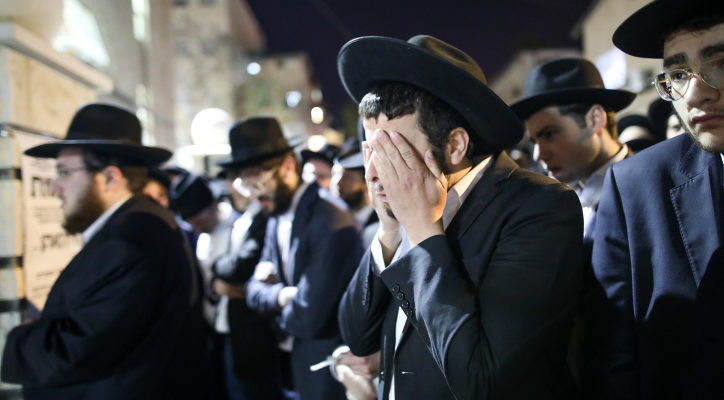Israeli TV news channel releases internal police report before the tragedy that claimed 45 lives, showing they feared disaster at the exact spot.
By Paul Shindman, World Israel News
Israel’s national police force knew in advance that there were serious shortcomings endangering the annual Lag BaOmer pilgrimage in northern Israel last week, with a police review before the disastrous evening highlighting the specific danger at the location where 45 people died, Channel 13 reported Monday.
A police PowerPoint presentation prepared before the event obtained by the Channel 13 shows security officials were acutely aware of several major trouble spots at the Mount Meron site in the Galilee area that could not safely contain the throngs of people expected to attend.
Over 100,000 mostly ultra-Orthodox Jews attended the event Thursday night at the site of the tomb of a revered second century rabbi.
At about 1:30 a.m. Friday, people packed into a closed passageway with a steep slope slipped backwards, causing a domino effect that piled hundreds of people on top of each other. Forty-five people were crushed to death and hundreds more were injured. Five people remain hospitalized, two of them still in critical condition.
The report specifically noted that the bonfire lighting ceremony at that spot “was not appropriate for the site … on account that the number of participants rises above the capacity of the site.”
While organizers had authorized 3,000 people to attend in that area of Mount Meron, there were at least 12,000 people packed into the same area, Channel 12 reported.
The police presentation contained more than 100 pages of details about the event. Police preparations normally take into consideration threats of terror attacks at such types of events, but the report also listed the dangers of the mass revelry including specific warnings of overcrowding at the entrances and at the grave site, and of the collapse of buildings or grandstands.
“Despite the addition of additional grandstands, it is clear that the area is too small to accommodate the number of celebrants,” the report said of the specific location where the people were crushed to death. “Therefore, preparations must be made for its expansion,” the report continued, but those expansions were not carried and the disaster occurred at that precise location.
The police report noted that at the event in 2019 before the pandemic they were forced to cut the festivities short due to dangerous overcrowding where this year’s disaster occurred. Planners expected serious overcrowding between 12:30 a.m. and 4:30 a.m. and considered measures to reduce the crowding, but that did not happen.
The police had also given a long list of defects to the government authority for holy places that is controlled by the Ministry of Religious Affairs, but not all the changes had been effected, Channel 13 reported. Despite that, the engineer in charge of the site approved the event, with the minutes of the meeting with police showing that “all the defects have been corrected.” Those minutes have been handed over to the police investigation of the incident.
Politicians and critics have noted that due to internal struggles between different religious groups there is not one authority in charge of the annual event, and that many of the shortcomings found by previous official inquiries have never been rectified.
Police suspect that immediately after the disaster, religious officials tried to conceal evidence and interfere with the investigation. Police identified several unknown individuals who came to Mount Meron and began removing evidence from there, the report said.





